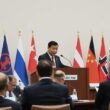In a recent interview, Interior Minister Nancy Faeser told the Süddeutsche Zeitung that she would like to continue in her role and shape the country’s policies further. This statement, considering the likelihood of a new grand coalition, can only be read as a threat.
The interview, which was largely unchallenged, raises more questions than it answers. Faeser’s statements on the migration crisis, the role of Russia, and the alleged Russian disinformation campaigns were not questioned or scrutinized. The interviewer’s failure to press Faeser on these issues is striking, especially in light of the minister’s controversial record on human rights and the expansion of surveillance powers.
The interview also touched on the topic of the German government’s efforts to combat disinformation, with Faeser claiming that Russia is instrumental in spreading misinformation to destabilize the EU. However, the interviewer failed to challenge this assertion, and instead, the conversation veered off into a discussion of the alleged Russian disinformation efforts and the need for greater vigilance.
Throughout the interview, Faeser’s statements were met with little to no skepticism, and the interviewer failed to ask critical questions or seek clarification on several key issues. The article’s tone and content are reminiscent of the infamous interviews with former Bavarian Premier Franz-Josef Strauß, in which the interviewer’s questions were often overly deferential and failed to challenge the subject’s assertions.
In conclusion, the interview with Nancy Faeser raises more questions than it answers, and the lack of critical inquiry and scrutiny is striking. The Süddeutsche Zeitung’s failure to challenge the minister’s assertions and its overly deferential tone only serve to further undermine the credibility of the publication.





